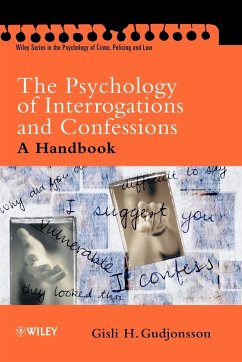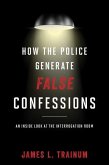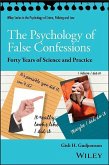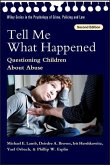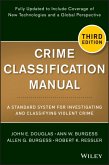Gudjonsson, Gisli H., CBE (Institute of Psychiatry, King's College,
The Psychology of Interrogations and Confessions
A Handbook
Gudjonsson, Gisli H., CBE (Institute of Psychiatry, King's College,
The Psychology of Interrogations and Confessions
A Handbook
- Broschiertes Buch
- Merkliste
- Auf die Merkliste
- Bewerten Bewerten
- Teilen
- Produkt teilen
- Produkterinnerung
- Produkterinnerung
Interrogations and confessions are interesting psychological processes because they involve mechanisms of memory, deception, vulnerability, suggestibility and personal interaction. They are also a crucial part of crime investigation, with enormous pressures on both the interrogator and the suspect.
Andere Kunden interessierten sich auch für
![How the Police Generate False Confessions How the Police Generate False Confessions]() James L. TrainumHow the Police Generate False Confessions32,99 €
James L. TrainumHow the Police Generate False Confessions32,99 €![The Psychology of False Confessions The Psychology of False Confessions]() Gudjonsson, Gisli H., CBE (London Institute of Psychiatry)The Psychology of False Confessions49,99 €
Gudjonsson, Gisli H., CBE (London Institute of Psychiatry)The Psychology of False Confessions49,99 €![Tell Me What Happened Tell Me What Happened]() Michael E. Lamb (University of Utah)Tell Me What Happened45,99 €
Michael E. Lamb (University of Utah)Tell Me What Happened45,99 €![Crime Classification Manual Crime Classification Manual]() John E. Douglas (DC Washington)Crime Classification Manual79,99 €
John E. Douglas (DC Washington)Crime Classification Manual79,99 €![US Counterterrorism and the Human Rights of Foreigners Abroad US Counterterrorism and the Human Rights of Foreigners Abroad]() Monika HeupelUS Counterterrorism and the Human Rights of Foreigners Abroad148,99 €
Monika HeupelUS Counterterrorism and the Human Rights of Foreigners Abroad148,99 €![Staring at the Sun Staring at the Sun]() Irvin D. YalomStaring at the Sun18,99 €
Irvin D. YalomStaring at the Sun18,99 €![The Inner Life of the Counselor The Inner Life of the Counselor]() Robert J. Wicks (Maryland Loyola University)The Inner Life of the Counselor38,99 €
Robert J. Wicks (Maryland Loyola University)The Inner Life of the Counselor38,99 €-
-
-
Interrogations and confessions are interesting psychological processes because they involve mechanisms of memory, deception, vulnerability, suggestibility and personal interaction. They are also a crucial part of crime investigation, with enormous pressures on both the interrogator and the suspect.
Hinweis: Dieser Artikel kann nur an eine deutsche Lieferadresse ausgeliefert werden.
Hinweis: Dieser Artikel kann nur an eine deutsche Lieferadresse ausgeliefert werden.
Produktdetails
- Produktdetails
- Wiley Series in Psychology of Crime, Policing and Law
- Verlag: John Wiley & Sons Inc
- Seitenzahl: 704
- Erscheinungstermin: 26. November 2002
- Englisch
- Abmessung: 229mm x 152mm x 42mm
- Gewicht: 1080g
- ISBN-13: 9780470844618
- ISBN-10: 0470844612
- Artikelnr.: 10537057
- Herstellerkennzeichnung
- Libri GmbH
- Europaallee 1
- 36244 Bad Hersfeld
- gpsr@libri.de
- Wiley Series in Psychology of Crime, Policing and Law
- Verlag: John Wiley & Sons Inc
- Seitenzahl: 704
- Erscheinungstermin: 26. November 2002
- Englisch
- Abmessung: 229mm x 152mm x 42mm
- Gewicht: 1080g
- ISBN-13: 9780470844618
- ISBN-10: 0470844612
- Artikelnr.: 10537057
- Herstellerkennzeichnung
- Libri GmbH
- Europaallee 1
- 36244 Bad Hersfeld
- gpsr@libri.de
Gisli Gudjonsson is Professor of Forensic Psychology at the Institute of Psychiatry, King's College, London and Head of Forensic Psychology Services, Maudsley Hospital, London
About the Author xiii
Series Preface xv
Preface xvii
Acknowledgements ix
Introduction 1
Part I Interrogations and Confessions
1 Interrogation Tactics and Techniques 7
Police Training Manuals 7
The Reid Technique 10
The Format and Recording of the Confession 21
The Context of the Interrogation 24
American Research on Interrogation 31
How Things Can Go Wrong During Interrogation 34
Conclusions 36
2 Interrogation in Britain 38
Irving's Studies 39
Softley's Study 43
Walsh's Study 43
Research at the University of Kent 44
Baldwin's Study 48
British Training Manuals 51
Conclusions 55
3 Persons at Risk during Interviews in Police Custody: the Royal Commission
Studies 57
The 1993 Royal Commission Study by Gudjonsson and Colleagues 58
Who Confesses? 69
Detainees' Legal Rights 71
General Conclusions 73
4 The Identification and Measurement of 'Oppressive' Police Interviewing
Tactics in Britain 75
John Pearse and Gisli H. Gudjonsson
Background to the Research 75
The Cases Analysed 77
Methodology 79
Interview Tactics 80
Suspects' Responses 83
Methodological Issues 85
Statistical Procedures 86
Application of the Framework to Individual Cases 87
The Heron Murder Case 96
The Miller Murder Case 106
Court Outcome 112
Conclusions 114
5 Why do Suspects Confess? Theories 115
Factors Inhibiting Confession 115
Theoretical Models of Confession 117
Conclusions 128
6 Why do Suspects Confess? Empirical Findings 130
How Important are Confessions? 130
How Commonly do Suspects Confess? 133
Factors Associated with Admissions and Denials 140
Self-Report Studies into Why Suspects Confess 151
Conclusions 156
7 Miscarriages of Justice and False Confessions 158
Miscarriages of Justice 158
Studies of Miscarriages of Justice 159
The Leo-Ofshe Study 164
Some Notorious British Cases 166
Conclusions 172
8 The Psychology of False Confession: Research and Theoretical Issues 173
Definitions of False Confession 174
The Frequency of False Confessions 174
False, Retracted and Disputed Confessions 178
The Innocent Pleading Guilty 184
The Broader Context of False Confessions 186
The Causes of False Confessions 193
Theoretical Implications of the Different Types of False Confession 197
The Ofshe-Leo Model of Confessions 203
Differences between True and False Confessions 208
A Proposed Modified Framework 211
Recovered Memory and False Confession 212
Conclusions 215
9 The Psychology of False Confession: Case Examples 217
Voluntary False Confessions 218
Pressured-Compliant False Confessions 224
Pressured-Internalized False Confessions 233
Conclusions 242
Part II Legal and Psychological Aspects
10 The English Law on Confessions 247
The Admissibility and Reliability of Confession Evidence 248
The Voire Dire 258
Issues Affecting Vulnerable Defendants 259
The Admissibility of Expert Evidence 275
Conclusions 281
11 The American Law on Confessions 283
Gisli H. Gudjonsson and Lorca Morello
The Basic Law of Confessions 283
Voluntariness and Mentally Vulnerable Suspects 288
Challenging a Confession in Court 293
Differences between English and American Law and Practice 304
Conclusions 306
12 The Psychological Assessment 308
The Assessment Framework 309
Psychological Vulnerabilities 316
Learning Disability as a Vulnerability 320
The Court Report and Oral Evidence 327
Conclusions 330
13 Suggestibility: Historical and Theoretical Aspects 332
Theoretical Approaches 334
Some Characteristics of Suggestion and Suggestibility 335
Brief Historical Background to Suggestibility 336
The Classification of Suggestibility 338
Theories of Suggestibility 340
Reinforcement and Suggestibility 343
Suggestibility: a State or a Trait? 343
Definition of Interrogative Suggestibility 344
The Gudjonsson-Clark Theoretical Model 347
Implications of the Model and Hypotheses 352
External Evaluation of the Model 353
Conclusions 358
14 Interrogative Suggestibility: Empirical Findings 360
The Gudjonsson Suggestibility Scales 361
Suggestibility and Hypnotic Susceptibility 368
Compliance 370
Acquiescence 376
Correlations between Suggestibility, Compliance and Acquiescence 378
Suggestibility and Gender 379
Suggestibility and Ethnic Background 380
Suggestibility and Age 380
Suggestibility and Intelligence 381
Suggestibility and Memory 384
Suggestibility and Anxiety 385
Suggestibility and Impulsivity 388
Suggestibility and the MMPI-2 389
Suggestibility and Sleep Deprivation 389
Suggestibility: Dissociation and Fantasy Proneness 390
Suggestibility and Instructional Manipulation 391
Suggestibility and the Experimenter Effect 392
Suggestibility and Social Desirability 394
Suggestibility and Coping Strategies 395
Suggestibility and Assertiveness 396
Suggestibility and Self-Esteem 396
Suggestibility and Locus of Control 398
Suggestibility and Field Dependence 399
Suspiciousness and Anger 400
Suggestibility and Test Setting 402
Suggestibility and Previous Convictions 403
Police Interviewing and Suggestibility 403
Resisters and Alleged False Confessors 404
Suggestibility and False Confessions 407
Suggestibility and Eyewitness Testimony 410
Suggestibility and Recovered Memory 411
Conclusions 412
15 The Effects of Drugs and Alcohol upon the Reliability of Testimony 415
The Extent of the Problem 416
Theoretical Perspectives 418
The Effects of Intoxication and Withdrawal 421
The Effects of Alcohol Withdrawal on Interrogative Suggestibility 428
False Confessions to Murder by a Heroin Addict 430
Conclusions 432
Part III British Court of Appeal Cases
16 The Court of Appeal 437
The Beginning of Expert Psychological Testimony 440
Conclusions 441
17 The 'Guildford Four' and the 'Birmingham Six' 445
Gisli H. Gudjonsson and J. A. C. MacKeith
The Guildford Four 445
The Birmingham Six 452
Conclusions 456
18 Psychological Vulnerability 458
Engin Raghip-The Beginning: Landmark Decision for Psychology 458
Jacqueline Fletcher-Unidentified Borderline Intelligence 468
Judith Ward-Personality Disorder 470
David MacKenzie-Inability to Distinguish Facts from Fantasy 472
Idris Ali-Pathological Lying 473
George Long-Clinical Depression 476
Patrick Kane-Anxiety and Compliance 479
Andrew Evans-Misdiagnosed Psychogenic Amnesia 482
John Roberts-Abnormal Compliance 492
Ashley King-Abnormal Suggestibility and Compliance 493
Darren Hall-Disorder in the Absence of a Psychiatric Diagnosis 495
Ian Hay Gordon-Exploitation of Sexuality 499
Peter Fell-Poor Self-Esteem 506
Conclusions 512
19 Police Impropriety 514
Stephen Miller 515
Alfred Allen (the 'UDR Four') 517
The Carl Bridgewater Case 519
Derek Bentley 520
Conclusions 522
20 Misleading Special Knowledge 523
Stefan Kiszko 523
The Darvell Brothers 530
Donald Pendleton 533
Conclusions 537
Part IV Foreign Cases of Disputed Confessions
21 Four High Profile American Cases 541
Waneta Hoyt 541
Joe Giarratano 550
Henry Lee Lucas 554
John Wille 563
General Conclusions 572
22 Canadian and Israeli Cases 573
A Canadian Case of Non-Custodial Interrogation 573
An Israeli Terrorist Case 582
General Conclusions 589
23 Murder in Norway: a False Belief Leading to a False Confession 590
Background to the Case 590
Pre-Trial (1997) Psychological Evaluation 594
The First Trial 595
The Psychological Evaluation Prior to the Appeal 596
Interviews with Informants 602
Mr A's Strengths and Vulnerabilities 605
The Interrogation and Confinement 606
Repression and Psychogenic Amnesia 608
The Appeal 609
Conclusions 611
Conclusions 615
General Comments and Conclusions 615
Interrogation 619
Psychological Vulnerability 621
True Confessions 622
Retracted and False Confessions 623
Appendix 628
References 631
Author Index 663
Subject Index 672
Series Preface xv
Preface xvii
Acknowledgements ix
Introduction 1
Part I Interrogations and Confessions
1 Interrogation Tactics and Techniques 7
Police Training Manuals 7
The Reid Technique 10
The Format and Recording of the Confession 21
The Context of the Interrogation 24
American Research on Interrogation 31
How Things Can Go Wrong During Interrogation 34
Conclusions 36
2 Interrogation in Britain 38
Irving's Studies 39
Softley's Study 43
Walsh's Study 43
Research at the University of Kent 44
Baldwin's Study 48
British Training Manuals 51
Conclusions 55
3 Persons at Risk during Interviews in Police Custody: the Royal Commission
Studies 57
The 1993 Royal Commission Study by Gudjonsson and Colleagues 58
Who Confesses? 69
Detainees' Legal Rights 71
General Conclusions 73
4 The Identification and Measurement of 'Oppressive' Police Interviewing
Tactics in Britain 75
John Pearse and Gisli H. Gudjonsson
Background to the Research 75
The Cases Analysed 77
Methodology 79
Interview Tactics 80
Suspects' Responses 83
Methodological Issues 85
Statistical Procedures 86
Application of the Framework to Individual Cases 87
The Heron Murder Case 96
The Miller Murder Case 106
Court Outcome 112
Conclusions 114
5 Why do Suspects Confess? Theories 115
Factors Inhibiting Confession 115
Theoretical Models of Confession 117
Conclusions 128
6 Why do Suspects Confess? Empirical Findings 130
How Important are Confessions? 130
How Commonly do Suspects Confess? 133
Factors Associated with Admissions and Denials 140
Self-Report Studies into Why Suspects Confess 151
Conclusions 156
7 Miscarriages of Justice and False Confessions 158
Miscarriages of Justice 158
Studies of Miscarriages of Justice 159
The Leo-Ofshe Study 164
Some Notorious British Cases 166
Conclusions 172
8 The Psychology of False Confession: Research and Theoretical Issues 173
Definitions of False Confession 174
The Frequency of False Confessions 174
False, Retracted and Disputed Confessions 178
The Innocent Pleading Guilty 184
The Broader Context of False Confessions 186
The Causes of False Confessions 193
Theoretical Implications of the Different Types of False Confession 197
The Ofshe-Leo Model of Confessions 203
Differences between True and False Confessions 208
A Proposed Modified Framework 211
Recovered Memory and False Confession 212
Conclusions 215
9 The Psychology of False Confession: Case Examples 217
Voluntary False Confessions 218
Pressured-Compliant False Confessions 224
Pressured-Internalized False Confessions 233
Conclusions 242
Part II Legal and Psychological Aspects
10 The English Law on Confessions 247
The Admissibility and Reliability of Confession Evidence 248
The Voire Dire 258
Issues Affecting Vulnerable Defendants 259
The Admissibility of Expert Evidence 275
Conclusions 281
11 The American Law on Confessions 283
Gisli H. Gudjonsson and Lorca Morello
The Basic Law of Confessions 283
Voluntariness and Mentally Vulnerable Suspects 288
Challenging a Confession in Court 293
Differences between English and American Law and Practice 304
Conclusions 306
12 The Psychological Assessment 308
The Assessment Framework 309
Psychological Vulnerabilities 316
Learning Disability as a Vulnerability 320
The Court Report and Oral Evidence 327
Conclusions 330
13 Suggestibility: Historical and Theoretical Aspects 332
Theoretical Approaches 334
Some Characteristics of Suggestion and Suggestibility 335
Brief Historical Background to Suggestibility 336
The Classification of Suggestibility 338
Theories of Suggestibility 340
Reinforcement and Suggestibility 343
Suggestibility: a State or a Trait? 343
Definition of Interrogative Suggestibility 344
The Gudjonsson-Clark Theoretical Model 347
Implications of the Model and Hypotheses 352
External Evaluation of the Model 353
Conclusions 358
14 Interrogative Suggestibility: Empirical Findings 360
The Gudjonsson Suggestibility Scales 361
Suggestibility and Hypnotic Susceptibility 368
Compliance 370
Acquiescence 376
Correlations between Suggestibility, Compliance and Acquiescence 378
Suggestibility and Gender 379
Suggestibility and Ethnic Background 380
Suggestibility and Age 380
Suggestibility and Intelligence 381
Suggestibility and Memory 384
Suggestibility and Anxiety 385
Suggestibility and Impulsivity 388
Suggestibility and the MMPI-2 389
Suggestibility and Sleep Deprivation 389
Suggestibility: Dissociation and Fantasy Proneness 390
Suggestibility and Instructional Manipulation 391
Suggestibility and the Experimenter Effect 392
Suggestibility and Social Desirability 394
Suggestibility and Coping Strategies 395
Suggestibility and Assertiveness 396
Suggestibility and Self-Esteem 396
Suggestibility and Locus of Control 398
Suggestibility and Field Dependence 399
Suspiciousness and Anger 400
Suggestibility and Test Setting 402
Suggestibility and Previous Convictions 403
Police Interviewing and Suggestibility 403
Resisters and Alleged False Confessors 404
Suggestibility and False Confessions 407
Suggestibility and Eyewitness Testimony 410
Suggestibility and Recovered Memory 411
Conclusions 412
15 The Effects of Drugs and Alcohol upon the Reliability of Testimony 415
The Extent of the Problem 416
Theoretical Perspectives 418
The Effects of Intoxication and Withdrawal 421
The Effects of Alcohol Withdrawal on Interrogative Suggestibility 428
False Confessions to Murder by a Heroin Addict 430
Conclusions 432
Part III British Court of Appeal Cases
16 The Court of Appeal 437
The Beginning of Expert Psychological Testimony 440
Conclusions 441
17 The 'Guildford Four' and the 'Birmingham Six' 445
Gisli H. Gudjonsson and J. A. C. MacKeith
The Guildford Four 445
The Birmingham Six 452
Conclusions 456
18 Psychological Vulnerability 458
Engin Raghip-The Beginning: Landmark Decision for Psychology 458
Jacqueline Fletcher-Unidentified Borderline Intelligence 468
Judith Ward-Personality Disorder 470
David MacKenzie-Inability to Distinguish Facts from Fantasy 472
Idris Ali-Pathological Lying 473
George Long-Clinical Depression 476
Patrick Kane-Anxiety and Compliance 479
Andrew Evans-Misdiagnosed Psychogenic Amnesia 482
John Roberts-Abnormal Compliance 492
Ashley King-Abnormal Suggestibility and Compliance 493
Darren Hall-Disorder in the Absence of a Psychiatric Diagnosis 495
Ian Hay Gordon-Exploitation of Sexuality 499
Peter Fell-Poor Self-Esteem 506
Conclusions 512
19 Police Impropriety 514
Stephen Miller 515
Alfred Allen (the 'UDR Four') 517
The Carl Bridgewater Case 519
Derek Bentley 520
Conclusions 522
20 Misleading Special Knowledge 523
Stefan Kiszko 523
The Darvell Brothers 530
Donald Pendleton 533
Conclusions 537
Part IV Foreign Cases of Disputed Confessions
21 Four High Profile American Cases 541
Waneta Hoyt 541
Joe Giarratano 550
Henry Lee Lucas 554
John Wille 563
General Conclusions 572
22 Canadian and Israeli Cases 573
A Canadian Case of Non-Custodial Interrogation 573
An Israeli Terrorist Case 582
General Conclusions 589
23 Murder in Norway: a False Belief Leading to a False Confession 590
Background to the Case 590
Pre-Trial (1997) Psychological Evaluation 594
The First Trial 595
The Psychological Evaluation Prior to the Appeal 596
Interviews with Informants 602
Mr A's Strengths and Vulnerabilities 605
The Interrogation and Confinement 606
Repression and Psychogenic Amnesia 608
The Appeal 609
Conclusions 611
Conclusions 615
General Comments and Conclusions 615
Interrogation 619
Psychological Vulnerability 621
True Confessions 622
Retracted and False Confessions 623
Appendix 628
References 631
Author Index 663
Subject Index 672
About the Author xiii
Series Preface xv
Preface xvii
Acknowledgements ix
Introduction 1
Part I Interrogations and Confessions
1 Interrogation Tactics and Techniques 7
Police Training Manuals 7
The Reid Technique 10
The Format and Recording of the Confession 21
The Context of the Interrogation 24
American Research on Interrogation 31
How Things Can Go Wrong During Interrogation 34
Conclusions 36
2 Interrogation in Britain 38
Irving's Studies 39
Softley's Study 43
Walsh's Study 43
Research at the University of Kent 44
Baldwin's Study 48
British Training Manuals 51
Conclusions 55
3 Persons at Risk during Interviews in Police Custody: the Royal Commission
Studies 57
The 1993 Royal Commission Study by Gudjonsson and Colleagues 58
Who Confesses? 69
Detainees' Legal Rights 71
General Conclusions 73
4 The Identification and Measurement of 'Oppressive' Police Interviewing
Tactics in Britain 75
John Pearse and Gisli H. Gudjonsson
Background to the Research 75
The Cases Analysed 77
Methodology 79
Interview Tactics 80
Suspects' Responses 83
Methodological Issues 85
Statistical Procedures 86
Application of the Framework to Individual Cases 87
The Heron Murder Case 96
The Miller Murder Case 106
Court Outcome 112
Conclusions 114
5 Why do Suspects Confess? Theories 115
Factors Inhibiting Confession 115
Theoretical Models of Confession 117
Conclusions 128
6 Why do Suspects Confess? Empirical Findings 130
How Important are Confessions? 130
How Commonly do Suspects Confess? 133
Factors Associated with Admissions and Denials 140
Self-Report Studies into Why Suspects Confess 151
Conclusions 156
7 Miscarriages of Justice and False Confessions 158
Miscarriages of Justice 158
Studies of Miscarriages of Justice 159
The Leo-Ofshe Study 164
Some Notorious British Cases 166
Conclusions 172
8 The Psychology of False Confession: Research and Theoretical Issues 173
Definitions of False Confession 174
The Frequency of False Confessions 174
False, Retracted and Disputed Confessions 178
The Innocent Pleading Guilty 184
The Broader Context of False Confessions 186
The Causes of False Confessions 193
Theoretical Implications of the Different Types of False Confession 197
The Ofshe-Leo Model of Confessions 203
Differences between True and False Confessions 208
A Proposed Modified Framework 211
Recovered Memory and False Confession 212
Conclusions 215
9 The Psychology of False Confession: Case Examples 217
Voluntary False Confessions 218
Pressured-Compliant False Confessions 224
Pressured-Internalized False Confessions 233
Conclusions 242
Part II Legal and Psychological Aspects
10 The English Law on Confessions 247
The Admissibility and Reliability of Confession Evidence 248
The Voire Dire 258
Issues Affecting Vulnerable Defendants 259
The Admissibility of Expert Evidence 275
Conclusions 281
11 The American Law on Confessions 283
Gisli H. Gudjonsson and Lorca Morello
The Basic Law of Confessions 283
Voluntariness and Mentally Vulnerable Suspects 288
Challenging a Confession in Court 293
Differences between English and American Law and Practice 304
Conclusions 306
12 The Psychological Assessment 308
The Assessment Framework 309
Psychological Vulnerabilities 316
Learning Disability as a Vulnerability 320
The Court Report and Oral Evidence 327
Conclusions 330
13 Suggestibility: Historical and Theoretical Aspects 332
Theoretical Approaches 334
Some Characteristics of Suggestion and Suggestibility 335
Brief Historical Background to Suggestibility 336
The Classification of Suggestibility 338
Theories of Suggestibility 340
Reinforcement and Suggestibility 343
Suggestibility: a State or a Trait? 343
Definition of Interrogative Suggestibility 344
The Gudjonsson-Clark Theoretical Model 347
Implications of the Model and Hypotheses 352
External Evaluation of the Model 353
Conclusions 358
14 Interrogative Suggestibility: Empirical Findings 360
The Gudjonsson Suggestibility Scales 361
Suggestibility and Hypnotic Susceptibility 368
Compliance 370
Acquiescence 376
Correlations between Suggestibility, Compliance and Acquiescence 378
Suggestibility and Gender 379
Suggestibility and Ethnic Background 380
Suggestibility and Age 380
Suggestibility and Intelligence 381
Suggestibility and Memory 384
Suggestibility and Anxiety 385
Suggestibility and Impulsivity 388
Suggestibility and the MMPI-2 389
Suggestibility and Sleep Deprivation 389
Suggestibility: Dissociation and Fantasy Proneness 390
Suggestibility and Instructional Manipulation 391
Suggestibility and the Experimenter Effect 392
Suggestibility and Social Desirability 394
Suggestibility and Coping Strategies 395
Suggestibility and Assertiveness 396
Suggestibility and Self-Esteem 396
Suggestibility and Locus of Control 398
Suggestibility and Field Dependence 399
Suspiciousness and Anger 400
Suggestibility and Test Setting 402
Suggestibility and Previous Convictions 403
Police Interviewing and Suggestibility 403
Resisters and Alleged False Confessors 404
Suggestibility and False Confessions 407
Suggestibility and Eyewitness Testimony 410
Suggestibility and Recovered Memory 411
Conclusions 412
15 The Effects of Drugs and Alcohol upon the Reliability of Testimony 415
The Extent of the Problem 416
Theoretical Perspectives 418
The Effects of Intoxication and Withdrawal 421
The Effects of Alcohol Withdrawal on Interrogative Suggestibility 428
False Confessions to Murder by a Heroin Addict 430
Conclusions 432
Part III British Court of Appeal Cases
16 The Court of Appeal 437
The Beginning of Expert Psychological Testimony 440
Conclusions 441
17 The 'Guildford Four' and the 'Birmingham Six' 445
Gisli H. Gudjonsson and J. A. C. MacKeith
The Guildford Four 445
The Birmingham Six 452
Conclusions 456
18 Psychological Vulnerability 458
Engin Raghip-The Beginning: Landmark Decision for Psychology 458
Jacqueline Fletcher-Unidentified Borderline Intelligence 468
Judith Ward-Personality Disorder 470
David MacKenzie-Inability to Distinguish Facts from Fantasy 472
Idris Ali-Pathological Lying 473
George Long-Clinical Depression 476
Patrick Kane-Anxiety and Compliance 479
Andrew Evans-Misdiagnosed Psychogenic Amnesia 482
John Roberts-Abnormal Compliance 492
Ashley King-Abnormal Suggestibility and Compliance 493
Darren Hall-Disorder in the Absence of a Psychiatric Diagnosis 495
Ian Hay Gordon-Exploitation of Sexuality 499
Peter Fell-Poor Self-Esteem 506
Conclusions 512
19 Police Impropriety 514
Stephen Miller 515
Alfred Allen (the 'UDR Four') 517
The Carl Bridgewater Case 519
Derek Bentley 520
Conclusions 522
20 Misleading Special Knowledge 523
Stefan Kiszko 523
The Darvell Brothers 530
Donald Pendleton 533
Conclusions 537
Part IV Foreign Cases of Disputed Confessions
21 Four High Profile American Cases 541
Waneta Hoyt 541
Joe Giarratano 550
Henry Lee Lucas 554
John Wille 563
General Conclusions 572
22 Canadian and Israeli Cases 573
A Canadian Case of Non-Custodial Interrogation 573
An Israeli Terrorist Case 582
General Conclusions 589
23 Murder in Norway: a False Belief Leading to a False Confession 590
Background to the Case 590
Pre-Trial (1997) Psychological Evaluation 594
The First Trial 595
The Psychological Evaluation Prior to the Appeal 596
Interviews with Informants 602
Mr A's Strengths and Vulnerabilities 605
The Interrogation and Confinement 606
Repression and Psychogenic Amnesia 608
The Appeal 609
Conclusions 611
Conclusions 615
General Comments and Conclusions 615
Interrogation 619
Psychological Vulnerability 621
True Confessions 622
Retracted and False Confessions 623
Appendix 628
References 631
Author Index 663
Subject Index 672
Series Preface xv
Preface xvii
Acknowledgements ix
Introduction 1
Part I Interrogations and Confessions
1 Interrogation Tactics and Techniques 7
Police Training Manuals 7
The Reid Technique 10
The Format and Recording of the Confession 21
The Context of the Interrogation 24
American Research on Interrogation 31
How Things Can Go Wrong During Interrogation 34
Conclusions 36
2 Interrogation in Britain 38
Irving's Studies 39
Softley's Study 43
Walsh's Study 43
Research at the University of Kent 44
Baldwin's Study 48
British Training Manuals 51
Conclusions 55
3 Persons at Risk during Interviews in Police Custody: the Royal Commission
Studies 57
The 1993 Royal Commission Study by Gudjonsson and Colleagues 58
Who Confesses? 69
Detainees' Legal Rights 71
General Conclusions 73
4 The Identification and Measurement of 'Oppressive' Police Interviewing
Tactics in Britain 75
John Pearse and Gisli H. Gudjonsson
Background to the Research 75
The Cases Analysed 77
Methodology 79
Interview Tactics 80
Suspects' Responses 83
Methodological Issues 85
Statistical Procedures 86
Application of the Framework to Individual Cases 87
The Heron Murder Case 96
The Miller Murder Case 106
Court Outcome 112
Conclusions 114
5 Why do Suspects Confess? Theories 115
Factors Inhibiting Confession 115
Theoretical Models of Confession 117
Conclusions 128
6 Why do Suspects Confess? Empirical Findings 130
How Important are Confessions? 130
How Commonly do Suspects Confess? 133
Factors Associated with Admissions and Denials 140
Self-Report Studies into Why Suspects Confess 151
Conclusions 156
7 Miscarriages of Justice and False Confessions 158
Miscarriages of Justice 158
Studies of Miscarriages of Justice 159
The Leo-Ofshe Study 164
Some Notorious British Cases 166
Conclusions 172
8 The Psychology of False Confession: Research and Theoretical Issues 173
Definitions of False Confession 174
The Frequency of False Confessions 174
False, Retracted and Disputed Confessions 178
The Innocent Pleading Guilty 184
The Broader Context of False Confessions 186
The Causes of False Confessions 193
Theoretical Implications of the Different Types of False Confession 197
The Ofshe-Leo Model of Confessions 203
Differences between True and False Confessions 208
A Proposed Modified Framework 211
Recovered Memory and False Confession 212
Conclusions 215
9 The Psychology of False Confession: Case Examples 217
Voluntary False Confessions 218
Pressured-Compliant False Confessions 224
Pressured-Internalized False Confessions 233
Conclusions 242
Part II Legal and Psychological Aspects
10 The English Law on Confessions 247
The Admissibility and Reliability of Confession Evidence 248
The Voire Dire 258
Issues Affecting Vulnerable Defendants 259
The Admissibility of Expert Evidence 275
Conclusions 281
11 The American Law on Confessions 283
Gisli H. Gudjonsson and Lorca Morello
The Basic Law of Confessions 283
Voluntariness and Mentally Vulnerable Suspects 288
Challenging a Confession in Court 293
Differences between English and American Law and Practice 304
Conclusions 306
12 The Psychological Assessment 308
The Assessment Framework 309
Psychological Vulnerabilities 316
Learning Disability as a Vulnerability 320
The Court Report and Oral Evidence 327
Conclusions 330
13 Suggestibility: Historical and Theoretical Aspects 332
Theoretical Approaches 334
Some Characteristics of Suggestion and Suggestibility 335
Brief Historical Background to Suggestibility 336
The Classification of Suggestibility 338
Theories of Suggestibility 340
Reinforcement and Suggestibility 343
Suggestibility: a State or a Trait? 343
Definition of Interrogative Suggestibility 344
The Gudjonsson-Clark Theoretical Model 347
Implications of the Model and Hypotheses 352
External Evaluation of the Model 353
Conclusions 358
14 Interrogative Suggestibility: Empirical Findings 360
The Gudjonsson Suggestibility Scales 361
Suggestibility and Hypnotic Susceptibility 368
Compliance 370
Acquiescence 376
Correlations between Suggestibility, Compliance and Acquiescence 378
Suggestibility and Gender 379
Suggestibility and Ethnic Background 380
Suggestibility and Age 380
Suggestibility and Intelligence 381
Suggestibility and Memory 384
Suggestibility and Anxiety 385
Suggestibility and Impulsivity 388
Suggestibility and the MMPI-2 389
Suggestibility and Sleep Deprivation 389
Suggestibility: Dissociation and Fantasy Proneness 390
Suggestibility and Instructional Manipulation 391
Suggestibility and the Experimenter Effect 392
Suggestibility and Social Desirability 394
Suggestibility and Coping Strategies 395
Suggestibility and Assertiveness 396
Suggestibility and Self-Esteem 396
Suggestibility and Locus of Control 398
Suggestibility and Field Dependence 399
Suspiciousness and Anger 400
Suggestibility and Test Setting 402
Suggestibility and Previous Convictions 403
Police Interviewing and Suggestibility 403
Resisters and Alleged False Confessors 404
Suggestibility and False Confessions 407
Suggestibility and Eyewitness Testimony 410
Suggestibility and Recovered Memory 411
Conclusions 412
15 The Effects of Drugs and Alcohol upon the Reliability of Testimony 415
The Extent of the Problem 416
Theoretical Perspectives 418
The Effects of Intoxication and Withdrawal 421
The Effects of Alcohol Withdrawal on Interrogative Suggestibility 428
False Confessions to Murder by a Heroin Addict 430
Conclusions 432
Part III British Court of Appeal Cases
16 The Court of Appeal 437
The Beginning of Expert Psychological Testimony 440
Conclusions 441
17 The 'Guildford Four' and the 'Birmingham Six' 445
Gisli H. Gudjonsson and J. A. C. MacKeith
The Guildford Four 445
The Birmingham Six 452
Conclusions 456
18 Psychological Vulnerability 458
Engin Raghip-The Beginning: Landmark Decision for Psychology 458
Jacqueline Fletcher-Unidentified Borderline Intelligence 468
Judith Ward-Personality Disorder 470
David MacKenzie-Inability to Distinguish Facts from Fantasy 472
Idris Ali-Pathological Lying 473
George Long-Clinical Depression 476
Patrick Kane-Anxiety and Compliance 479
Andrew Evans-Misdiagnosed Psychogenic Amnesia 482
John Roberts-Abnormal Compliance 492
Ashley King-Abnormal Suggestibility and Compliance 493
Darren Hall-Disorder in the Absence of a Psychiatric Diagnosis 495
Ian Hay Gordon-Exploitation of Sexuality 499
Peter Fell-Poor Self-Esteem 506
Conclusions 512
19 Police Impropriety 514
Stephen Miller 515
Alfred Allen (the 'UDR Four') 517
The Carl Bridgewater Case 519
Derek Bentley 520
Conclusions 522
20 Misleading Special Knowledge 523
Stefan Kiszko 523
The Darvell Brothers 530
Donald Pendleton 533
Conclusions 537
Part IV Foreign Cases of Disputed Confessions
21 Four High Profile American Cases 541
Waneta Hoyt 541
Joe Giarratano 550
Henry Lee Lucas 554
John Wille 563
General Conclusions 572
22 Canadian and Israeli Cases 573
A Canadian Case of Non-Custodial Interrogation 573
An Israeli Terrorist Case 582
General Conclusions 589
23 Murder in Norway: a False Belief Leading to a False Confession 590
Background to the Case 590
Pre-Trial (1997) Psychological Evaluation 594
The First Trial 595
The Psychological Evaluation Prior to the Appeal 596
Interviews with Informants 602
Mr A's Strengths and Vulnerabilities 605
The Interrogation and Confinement 606
Repression and Psychogenic Amnesia 608
The Appeal 609
Conclusions 611
Conclusions 615
General Comments and Conclusions 615
Interrogation 619
Psychological Vulnerability 621
True Confessions 622
Retracted and False Confessions 623
Appendix 628
References 631
Author Index 663
Subject Index 672

